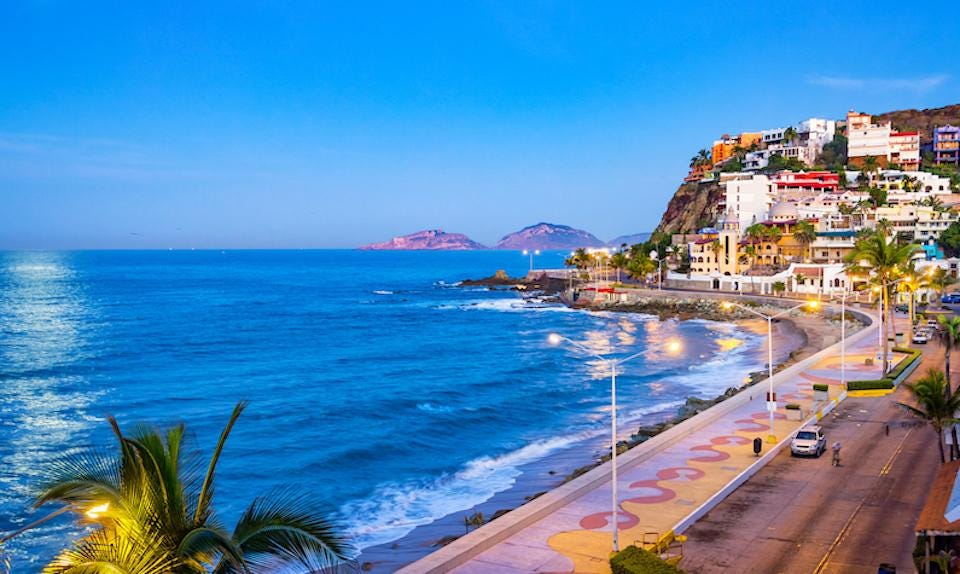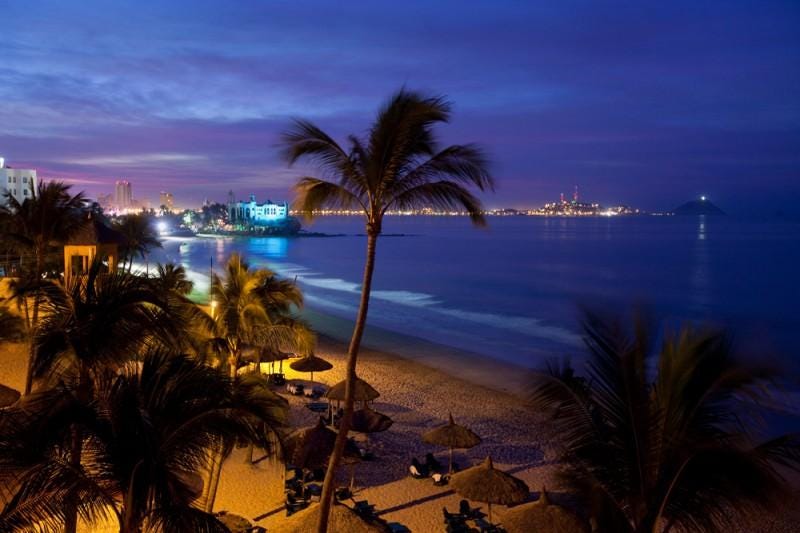Guest post by esteemed LatAm scholar: @GringoGuerrilla
It was my birthday week and what better way to spend it than a trip to the “Pearl of the Pacific,” the charming seaside city of Mazatlán, Mexico!
The day of my flight I packed a small bag, rushed to the Mexico City airport and, in a few hours, I was strolling the balmy streets of Sinaloa.
I hadn’t got as far as booking a hotel, but I did know of one. Hotel Belmar. I’d heard it was where John Wayne used to stay back in the day.
Apparently, it was also haunted, so I thought that might add some zest to the vacation.
The hotel was situated across the beach near Mazatlán’s historic center and, to my luck, they had rooms available. Cheaper than I expected – a mere 550 pesos or so (about $28 USD).
I spent the next few days touring the city center, walking the malecon, checking out viewpoints, eating top-notch seafood and cultivating an impressive tan at the nearby public beach.
One problem, though…I was getting bored!
Don’t get me wrong, I was enjoying myself and had indeed intended to simply hang out alone by the beach during my stay. But the weekend was approaching, and I didn’t have any amigos or any women to enjoy it with.
In fact, the only person I’d met was a Mexican kid who couldn’t have been more than 11-years-old. He always seemed to be hanging outside the hotel and never failed to catch me either when I left or returned.
Güero! Do you need anything? I can get you anything you need…anything.”
A nice kid, but I wasn’t about to recruit him to acquire drugs, prostitutes, or anything else nefarious, which he was quite clearly hinting at.
Also, he wasn’t exactly an option to hit the bars with.
Fortunately, I had an idea…
Friday afternoon, I decided to rent a room at a nearby hostel. My logic was that I could hang at the hostel for a few hours to meet some people but continue to sleep at the hotel (because, well, f*ck sleeping at hostels!).
After an awkward conversation about why I didn’t have luggage of any kind, I paid for my bed and walked upstairs to the terrace to see if I could spot some fellow travelers.
I noticed two Mexican guys smoking and drinking at a table. Not having any beers of my own, I took out a cig, lit it and sat down, the cigarette being my vague justification for joining them.
We got to chatting and it turns out these two Mexican guys – we’ll call them “Roman” and “Mateo” – were supermarket employees from the state of Guanajuato and had come to Sinaloa to help with the Marijuana harvest. They were treating themselves to a few days in Mazatlán before heading to the campo.
“Is it dangerous work?” I asked them.
“No, why would it be dangerous? It’s not complicated either and it pays well,” replied Roman.
As you might expect, I was finding this conversation rather interesting, so I popped down the street to buy some more beers to keep it flowing.
Roman and Mateo were old hands in the marijuana trimming game. They’d been at it a few years, taking a couple months off from their regular job to lend a hand with the lucrative Mexican crop.
They explained to me that this was fairly common practice for many men in Central and Southern Mexico, as it paid better than most were able to make otherwise.
The hostel worker who checked me in got off shift and joined us on the terrace. From there, we moved onto other conversation topics.
By now the sun was down, and we certainly had enough drinks in us to justify going out. The hostel worker had a spare motorcycle that his brother left him, so he suggested that we all head to a bar on the motos.
We arrived at the bar and – unsurprising for anyone who’s ever set foot in Mazatlán – Banda music was blaring at an extraordinary volume. Luckily for me, our time there was short lived.
“Let’s go to the beach, we’re meeting a friend.”
We rolled up to a spot on the malecon where a guy is waiting on the beach with a couple packs of beer and a couple packs of cigarettes. He’s one of the bigger Mexicans I’ve seen: about my height of 5’11 but twice my width.
I introduce myself and we start cracking open the Tecate Light.
“Hey, guys,” I said. “They’re not going to f*ck us over drinking on the beach? It’s happened to me enough times before.”
Roman and Mateo began to laugh.
The new friend politely explained to me that he is military, and that the local police would leave us alone if they came by.
Turns out, he grew up with Roman and Mateo and, after finishing his military training in Mexico State, they sent him to Sinaloa.
The conversation shifted to his job. It seemed it’d been a while since he, Mateo and Roman were in touch, so the two of them began asking him questions.
“What is it like? I mean…”
The military man knew what his pal was getting at.
“It’s fine. Todo tranquilo. We know all the faces of who not to mess with. So, we don’t find ourselves with too many problems.”
As the hostel worker lit a fat joint, the military guy proceeded to explain that, to reduce the risk of military members working with drug traffickers, the military tried to make sure none of the recruits assigned to any Mexican state are from that state. Hence, why they sent him – a Guanajuato native – to Sinaloa.
We finished the beers and pondered the next logical move.
Bar Tarrandas isn’t the most elegant strip club in Mazatlán, nor was it even the closest one to us at the time, but the now high-out-of-his-head hostel employee insisted it was the exact place we needed to be.
The five of us procured a table not far from the stage and I excused myself to the bathroom.
I finish peeing, turn away from the urinal and who do I see but the 11-year-old Mexican kid who was always hanging around outside my hotel.
“Eyy! What’s up, what are you doing here?” I asked.
He smiles, shrugging slightly.
Fair enough. Here I am asking a child what he’s doing in a strip club bathroom at 3am and expecting a satisfactory response.
“Oye y güero,” he says. “Don’t forget to let me know if you need anything.”
We both laugh.
I return to the table and find Mateo chatting up one of the dancers. I go to sit down, and she leaves shortly after.
“Was it something I did”? I said, jokingly.
“Nahhh, I don’t have any cash left. No tengo varo.”
“Well, how much is a dance?” I ask.
“80 pesos.”
In other words, $4 dollars…
“We’re all getting dances…well, except for you,” I said, turning to the 11-year-old kid who was now hanging around our table. “I’ll pay.”
The absurdity of the situation didn’t hit me at the time. Getting uninspired $4.00 lap dances with a member of the Mexican military and his childhood pals who were tangentially employed by a drug cartel, a hostel worker stoned out of his gord, all as an infant looked on with an air of comfort that would impress even the most weathered veterans of middling Latin American strip joints.
But it does make me laugh to look back on it.
We decided to leave shortly after. It was apparently somewhere the military man wasn’t even supposed to be, let alone enjoying dances, so we figured it best to call it a night.
I hopped on the back of the hostel worker’s moto and he headed to the hostel.
“Wait, can you drop me off somewhere else?” I asked. “It’s real close. Head to Olas Atlas, around where the Malecon starts.”
I directed him to Hotel Belmar.
“Wait. You’re staying in a hotel? Why are you paying for a room at the hostel?”
I shrugged.
“Honestly, I’m not really sure.”
He starts laughing hysterically and gives me a fist pump.
“You know this place is haunted, right?” he says.
“Mhm.”
“Pinches gringos,” he chuckles, before saying goodbye and riding off, the sunrise not far behind him.
Although this isn’t what I’d call a crazy story – particularly not by Nomada Newsletter standards – it is one that makes me smile. You had drug harvesters, a drug user and a man specifically tasked to fight such activities enjoying a night out as friends with a token gringo in tow.
And the beauty of Mexico and Mexicans is that this irony never would have occurred to them because we were simply…bros hanging out.
If nothing else, it’s a neat little example of Mexico’s surrealism as well as the subtle but present influence of the country’s drug trade and the thin lines that divide those who work on its periphery.



